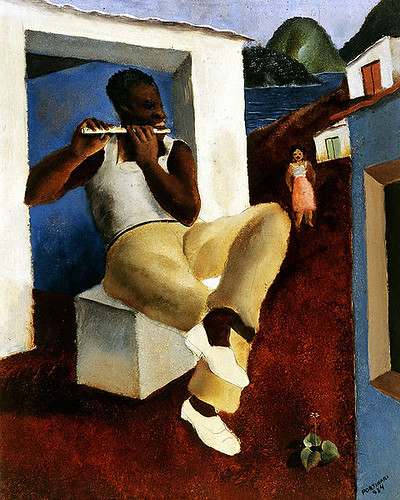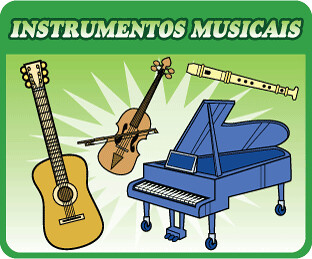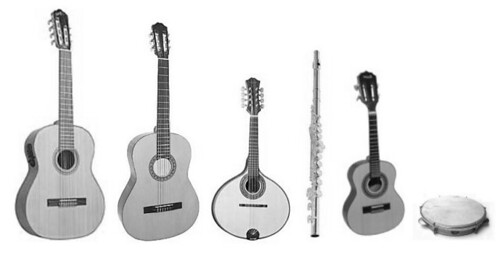***Warning: grammarphobes may want to skip this article. If you want to learn some of the points here more implicitly, you can practice the expressions here or here. I am adding a category 'avoid if you don't like grammar' so you can stick to the less heavy stuff.*** One of my students asked about impersonal verbs this week, so I thought I would share this with you in case you have similar questions...
...But wait. Don't Brazilians like to get personal? Fear not, you can hold on to the friendly Brazilian stereotypes :-). I don't mean impersonal in the sense of unfriendly or cold. This post is about impersonal in the sense of lacking person agreement (the different person conjugations) on the verb. If you have no idea what I am talking about, don't worry. I'll explain. (If you know what I am talking about you can skip the re-cap :-))
A. Re-cap: (Person) Verb Conjugation 101Remember that for beginners it can sometimes be tricky to remember all those different verb endings? For example, take the verb
falar (to speak) in the past (you can also look at
ser and estar):
(1)
Eu falei(2)
Você/ele/ela/a gente falou(3)
Nós falamos(4)
Vocês/eles/elas falaramSee how the verb endings are different depending on the subject? These different forms depending on the subject is what I am calling person agreement/ person conjugation. Compare with the English translation, where the verb doesn't change at all:
(1) I spoke.
(2) You/he/she/we spoke
(3) We spoke
(4) You/they spoke
That is because English shows no person agreement for the verb 'speak' in the past and Portuguese does.*
B. Impersonal verbs
If you have trouble remembering the endings you may like this. Not all verbs have different forms for different persons like the ones above. There are verbs that don't have different endings for different subjects... because they have no subject at all!
If you look up 'impersonal verbs' on a grammar, you will probably get the typical impersonal verbs, like some verbs describing the whether:
Nevou muito em Nova Iorque ontem.(It) snowed a lot in New York yesterday.
The verb
nevar in the simple past is always
nevou. There is usually no
nevei, nevamos, etc. Similarly, in English you can't use different subjects. You can only say 'it snowed', but not 'I snowed', 'we snowed'. Etc.
So we see two properties of impersonal verbs in Portuguese from the example:
Impersonal verbs:
(1) There is no subject.
(2) There aren't different person conjugations.
There are other 'classic' impersonal verbs (e.g., haver/ter (= English 'there is') , meaning to exist). There are also plenty of other expressions that are not these classic impersonal verbs that are grammatically impersonal. Here are a couple of examples of informal examples that we saw on this blog:
We saw one on the last post on
cair a ficha (meaning something like 'to click'), notice how the verb
cair doesn't change depending on the person:
Eu não estava entendendo nada, mas ontem finalmente caiu a ficha!I wasn't understanding anything, but yesterday it finally clicked.
Nós não estavamos entendendo nada, mas ontem finalmente caiu a ficha!We weren't understanding anything, but yesterday it finally clicked.
Eles não estavam entendendo nada, mas ontem finalmente caiu a ficha!They weren't understanding anything, but yesterday it finally clicked.
The verb
dar in the expression
dar para (meaning something like 'to be possible (for)') is also impersonal (even though the second verb is):
Não deu para eu chegar cedo ontem.(It) wasn't possible for me to arrive early yesterday.
Não deu para eles chegarem cedo ontem.(It) wasn't possible for them to arrive early yesterday.
Não deu para nós chegarmos cedo ontem.(It) wasn't possible for me to arrive early yesterday.
We will certainly be seeing some more examples of impersonal verbs come up on this blog, though we won't be discussing the grammar so explicitly every time (grammar tips are good in small dosis).
Exercises:1. Read the blog posts on the expressions 'cair a ficha' and 'dar para' if you haven't already done so (take your time. Don't do everything today!). Do the one exercise there.2. Google the following phrases to get more examples of these expressions (use the double quotes). Copy 6 sentences that you understood:a. "deu para eu", "dava para eles", "não dá pra eu", "não da pra elas" (note: pra is an informal reduced version of para)b. "choveu", "neva", "ventou"c. "caiu a ficha", "cai a ficha"3. Write six sentences of your own with the expressions in 2a, b and c.*English does have some person agreement, but it shows up in only a few cases. If you look at the verb 'speak' in the present (or any regular non-modal verb), you can see that there is a different form of the verb that depends on person. We say 'I speak' and 'she speak
s'. This is an example of person agreement. Another example is the verb 'be'. In this case we also have different forms (am,are,is) for different persons, even in the past ('was', 'were').





















